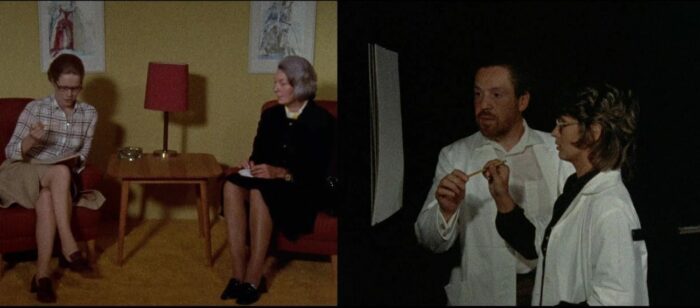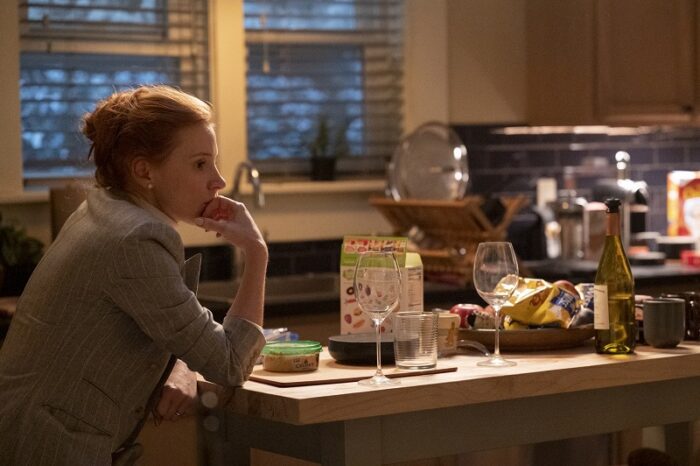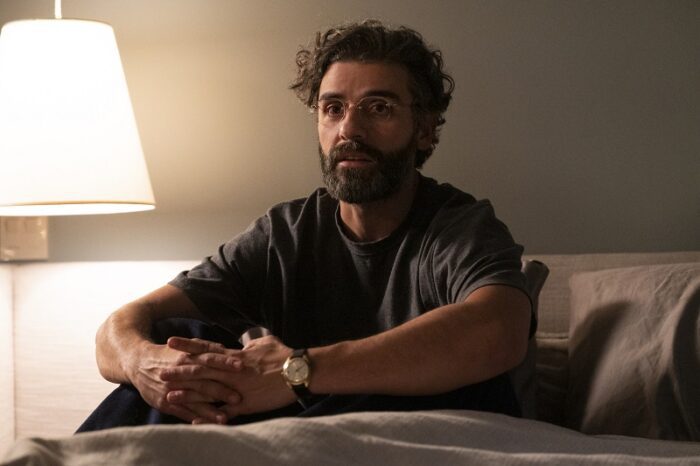The following contains spoilers for Scenes from a Marriage Episode 2, “Poli”
At the end of the first episode of writer-director Hagai Levi’s HBO prestige update of Ingmar Bergman’s Scenes from a Marriage, Mira (Jessica Chastain) was left sobbing alone under the paper sheets of an antiseptic examination room, following her and husband Jonathan’s (Oscar Isaac) decision to abort her pregnancy. Episode 2, “Poli,” opens as did the first episode with a bit of behind-the-scenes camerawork following the actor—this time Isaac—on his way to set through a labyrinth of last-minute reminders and COVID protocols.
Once Isaac is settled in character as Jonathan, there is at first no mention of that abortion and no indication of how much time has elapsed. He reads distractedly, cares for his daughter, logs on to his computer, and within a few seconds enters a porn site. Let’s hope this is not his Tufts University-issued machine, or he will soon have more than marital issues to address! He reaches downwards. Mercifully, Levi offers another ellipsis, this time for the title card, and soon Jonathan is in the kitchen prepping a late-night snack when he hears—and is elated to see—Mira return.
In my review of Episode 1, I noted how closely Levi was following Bergman to start the series. While the setting, names, and details have all been updated, the basic outline of the script of Episode 1 followed Bergman as closely as imaginable, each of its four scenes hewing tightly to those of the original 1973 broadcast, even the postures and gestures adopted by Chastain mimicking Liv Ullmann’s Marianne’s in the examination room at its conclusion.
Bergman’s Episode 2, however, is literally nowhere to be found in Levi’s update. Titled “The Art of Sweeping Things Under the Rug (Konsten att sopa under mattan),” it offered substantial insights to husband Johan (Erland Josephson) and wife Marianne’s motivations and traits in scenes that depicted the couple both apart, each of them in their respective workplaces, and together, ruminating on their lack of intimacy.

That Levi elides this episode poses something of a conundrum. Without some connection to who Mira and Jonathan are apart from each other, how can viewers fully understand them together? In contrast, Bergman’s workplace scenes are illuminating. Josephson’s Johan, a professor whose expertise appears to be in psychometrics, has developed a test he demonstrates to a female colleague, a trusted friend he knows well. But his instrument seems little more than a diversion, a trivial-pursuit parlor trick designed more to frustrate than enlighten. Johan is also, we learn, an aspiring poet, but his colleague dismisses his efforts. His once-great promise, it seems, has dwindled to purple prosody and purposeless experiment.
Meanwhile, Ullmann’s Marianne, a family lawyer specializing in divorce, meets with a client who describes her irreconcilable differences with her husband. She can touch, she says, but not feel. The conversation registers with Marianne, who realizes she too is missing something important in her life. Then, in a long post-meal conversation, Bergman’s Johan and Marianne examine, with equal parts rue and resignation, the ways in which their affection for each other had waned over the years. There’s nothing particularly abnormal or even surprising about the conversation, though we do learn from it more of what makes them incompatible, such as Johan’s blunt rejection of feminism. Exhausted, the two relent: “It’s possible to talk too much about these things, you know,” Marianne concludes.
What contemporary viewers miss from Levi’s having elected not to adapt Bergman’s second episode of Scenes from a Marriage, then, turns out to be a great deal. Oscar Isaac’s Jonathan is a professor of philosophy at Tufts, but we don’t see him teach or interact with any of his students or colleagues, even on Zoom. Jessica Chastain’s Mira is a high-level tech exec, but her work is even more amorphous and unseen; we know only that her work, unlike Jonathan’s, takes her frequently out of the home and onto the road. Was Jonathan destined for greatness only to stumble towards domestic and intellectual mediocrity? Did Mira find in her work some key insight to her own lack of fulfillment? Did their inability to resolve dissatisfaction through dialogue fester into something more malignant?
Without the kind of character development Bergman offered in his second episode, it’s more difficult to understand either of Levi’s protagonists’ motivations when Mira returns home early from a work trip with a shock pronouncement, one that visibly stuns Jonathan: “I’ve fallen in love with someone.” His name, she says, is “Poli.” He’s a tech exec like her, from Tel Aviv, and she plans to leave with him for Israel that night.

Only in the conversation that follows does the timeframe become more clear. It’s been eight months since the abortion, and a dinner with her friend Kate (played with fire by Nicole Beharie in Episode 1, but offscreen and unheard here) set her straight: “What kind of marriage needs an abortion to save it?” Mira asks, rhetorically, as if that revelation itself rationalized her affair.
“Why didn’t you talk to me about it?” asks Jonathan, incredulously, as Mira explains she felt suffocated. Jonathan even asks to see a picture. “How old is he? What does he do? Is he tall? Is he married? How did you meet?” His is less an interrogation than an exercise in self-flagellation. And hers, largely a rationalization of her adultery and decision to leave Jonathan—for good. Jonathan implores her to think about their daughter, Ava, but here too Mira declares her decision is best for her, even though saying so drives her to tears she doesn’t shed for Jonathan.
At an impasse, the two fall asleep, sexless but cradling each other; the next morning, Jonathan implores her to try to save the marriage. But he’s better, apparently, at folding clothes and packing suitcases than resolving issues. There is a brief physical altercation when he roughly pushes Mira away from his packing and soon she is on her way to meet their daughter before leaving for work and then Tel Aviv.

Though Levi has skipped the entirety of Bergman’s second episode and with it some key elements of characterization, his second episode closely echoes Bergman’s third episode entitled “Paula.” In it, Johan returns home from a work trip to announce to Marianne his having fallen in love with the (unseen) 23-year-old Paula, and Marianne desperately begs him not to leave her, pathetically sobbing and clutching at him as he exits.
That moment in Bergman is probably Marianne’s nadir and difficult even for Liv Ullmann to play in 1973, her character so pathetic and obsequious. Granted, by the end of the series Marianne would demonstrate a considerably greater development of character than the still-stunted Johan. But hers is hardly the dramatic, self-actualizing resolve of an Ibsen character (whose work Bergman’s characters discuss and as you can imagine Johan dismisses). And for a mature, intelligent, educated career woman to reduce herself to a sobbing, clutching mess desperate for her man to stay would hardly appeal to any empowered actress in 2021. And especially not to a powerful, accomplished, talented co-executive producer like Jessica Chastain.
So here, in Episode 2, Levi’s biggest change in his adaptation of Scenes from a Marriage is made manifest: the characters’ actions from Bergman’s are swapped. At this point in the narrative, Jonathan is not the adulterer but the betrayed; Mira is the one who not only has the affair but decides, emphatically and unilaterally, to end the marriage. Bergman was not exactly renowned for his feminism, even though many of his films featured female protagonists in subtle rebellions against patriarchal hegemonies. But it’s clear that to adapt his Scenes from a Marriage without an attendant change to 21st-century gender roles would leave Mira’s character and her portrayer a victim of a prior time’s even greater inequities.

Now that that “switch”—Levi’s big risk in the adaptation—is out in the open, it will be interesting to see how its implications play out for the characters. In the meantime, Levi continues to follow the rest of Bergman’s story beats. As difficult as it is for Jonathan to assimilate what’s happening as Mira leaves him standing alone in his doorway, his pain is doubled when he phones Kate and Peter. Like Marianne so painfully discovered at the end of Bergman’s Episode 3, their friends knew of the affair long beforehand. Having been left by his wife and humiliated by his friends, Jonathan collapses in an anguished, incoherent wail. His daughter Ava (Sophia Kapera), a far more constant presence here than in Bergman, watches.
Levi’s gender twist is one that make sense given the 48 years between his version and Bergman’s. Marianne’s character was, despite her profession, retrograde in 1973 and unimaginable today. But I still wonder: why omit the content of Bergman’s Episode 2, given the opportunity to draw characters more finely through their interactions with others at work? Levi’s metatextual episode preambles make much of COVID protocols. Was “The Art of Sweeping Things Under the Rug” a victim of COVID, of funding, of availability? A protocol breach temporarily halted production; perhaps the shoot was intentionally confined to a single set. Doing so certainly would have simplified managing some of the most challenging moments of the pandemic.
Mira complains that she feels “claustrophobic” in her and Jonathan’s house. Viewing Episode 2 feels likewise. While Bergman set this scene at the couple’s summer home, Levi stages it—and every other scene so far—in the couple’s primary and only home. Production designer Kevin Thompson and set decorator Stephanie Q. Bowen deserve props for its chaotic lived-in ambience. Those pre-episode précis make it enjoyable to see its behind-the-scenes trappings of matte backdrops, half-walls, and fake snow. I know how hard the labor force was hit during the pandemic, so I’m impressed and grateful to see their efforts come to fruition. This Scenes from a Marriage is a prestige production in every respect and not just its high-profile co-stars or source material.
To endure every moment of screen time on that same set, though, whether by design or as a consequence of the pandemic, will likely have most viewers feeling like me, like Mira—more than a little uncomfortably claustrophobic in its environs. Yet I don’t think any viewer of any version of Scenes from a Marriage anywhere in any medium is ever meant to feel comforted. And that sense of palpable discomfort is exactly what Levi’s Scenes from a Marriage continues to evoke: the gnawing temptation to get outside, whether the house or the marriage, that both denotes and vexes many a long-term, ostensibly monogamous relationship.


I didn’t feel claustrophobic I just felt bored. The most exciting part was when she said Poli was 29. You’re gonna leave your kid for a 29 year old, wow 😄😄😄. And you’re 41. I’d like some drama but meh, it dragged
Midlife. Crisis
This is an adult series in the truest sense: it takes patience and a depth of life experiences to relate to and respect. I saw both, the original series and the truncated film version, when I was younger and very happy this version is different and Americanized; the author of this article’s need to document the differences with personal disappointment — “things just ain’t the same” — undermines the brilliance of this rendering. As is often true with other series based on prior origin, viewers who are curious and or enthralled will seek out the source.
It is boring….boring…boring. Neither actor has slipped fully into their character. I saw Oscar Isaac pretending to be someone he was not and Jessica Chastain the same. Chastain is the same in every role I seen her play. Clearly depending on her looks and repetitive facial expressions, no depth. Nicole Beharie lit up episode 1 for about 15 mins….her husband was as boring as Isaac and Chastain. Timing is everything….character development is part of that. After watching the first episode, I simply didn’t care about anything or anyone in the movie. In the world we live in today, if you want to make a statement “create” work that has nothing to with the producers or actors name….or color.